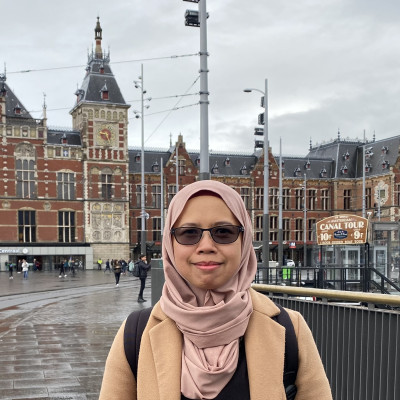Sessions / Graduate Student Showcase (15 mins)
Motivating Adult Korean Students Through the Characteristics and Behaviors of Language Teachers #3589
Current qualitative research illustrates the need for further research in specific language learner motivation contexts. The focus of this presentation is exploring the Korean adult learner context. The research aims to expand on work done by Dornyei and Csizer (1998) and also to find emerging characteristics that can be used by instructors in the context of the Korean classroom. The phenomenological qualitative research approach will be used, utilizing two groups of participants; Korean adult English learners and foreign adult English language teachers. Through two different methods of data collection (open-ended surveys and one-on-one interviews) data will be formulated using the Otter.ai and NVIVO software programs. Data will then be coded into groups and themes to interpret results and derive conclusions. The presenter will offer recommendations based on current research and anticipated trends in Korea. Audience participation is invited and encouraged to contribute to the ongoing research.
Rethinking Teacher Quality of Indonesian EFL Teachers #3592
The study is conducted to respond to the issue of English teacher quality in Indonesia. Despite the importance of English as a language taught and tested in Indonesian schools, there are issues concerning the competence of English teachers. Responding to this issue, the Indonesian government enacted some regulations which incorporate the mandated competencies to be achieved by teacher candidates in initial teacher education programs as well as to manage teacher professionalization. However, there is a lack of research on understanding the competency of teachers and their professional journey from teachers’ own perspectives. The information gathered from the teachers could be beneficial for policymakers to improve Indonesian education in a more democratic way. Therefore, employing the sociocultural perspective, this study will investigate EFL teachers' perceptions of teacher quality seen from their professional formation at pre-service teacher education programs.
Exploring a Potential Suitable Model for ETEPs (English Teacher Education Programs) in the Indonesian Context #3622
Studies noted unsatisfactory students’ English proficiency levels in the Indonesian context that potentially connect to the insufficient English teachers’ quality in this country. This study explores the possible suitable model of ETEPs in the Indonesian context from the perspectives of 66 internal stakeholders at four ETEPs. The data of this study gathered from interviewing four head of ETEPs, 10 teacher educators, 11 graduates, and conducting focus groups with 41 student teachers. The data were analysed using thematic analysis. The findings suggest that ETEPs should 1) apply tighter admission procedures 2) offer courses related current trend in ELT (English Language Teaching), 3) offer balance general and classroom English courses, 4) emphasis on reflection in teaching practice courses, and 5) provide compulsory and guided extracurricular activities. As such, this study can add to the limited literature on ETEPs model, and, ultimately, contribute to the quality of English teachers and Indonesian students’ English proficiency.
The Frequency of the Academic Words in American Sitcom The Big Bang Theory #3627
This study examines the use of academic words in The Big Bang Theory (TBBT), a popular American TV show known for its characterization and academic jargons. The aim of the study is to create a 100-word frequency list and 100-word academic word list for TBBT, and identify the most commonly used academic words in the show. Adapting a corpus-based approach, episodes from the first to ninth season were collected to create a TBBT corpus in Sketch Engine. The TBBT frequency list was generated using AntWordProfiler and compared with Coxhead's Academic Word List to create TBBTAWL. The findings suggest that both TBBT frequency list and TBBTAWL can serve as useful references for English language learners and instructors. This study highlights the significance of incorporating authentic language materials into language learning activities, and underscores the potential benefits of using television shows as a tool for language acquisition.
Integration of the 5E Model of Instruction in Bilingual Earth Science Class in a Senior High School in Taiwan #3630
This study aims to investigate how the content teachers apply 5E Model into bilingual classes and how students perceive this course design. Recently, the Taiwanese government launched the ‘Blueprint for Developing Taiwan into a Bilingual Nation by 2030’. In response to this policy, many teachers in Taiwan have implemented various bilingual teaching methods to help students comprehend and acquire both content and language knowledge. Some designed their courses using the 5E Model to give students clear guidelines. Little is known about the effect of the 5E Model in bilingual classes and if it works well in a Taiwanese context. This study aims to address this gap through questionnaires and interviews with both students and teachers in a bilingual earth science course in a senior high school in Taiwan. There are practical findings for bilingual teachers to develop comprehensive bilingual courses integrating the 5E Model.
Investigating Korean Primary School Teachers' Perceptions: Using AI English Assistive Technology, Pengtalk #3387
Will Artificial Intelligence (AI) replace English teachers in South Korea? This research investigates using AI for English education in Korean primary schools, including its advantages, disadvantages, and recommendations. The study employs qualitative methodology and semi-structured interviews (SSI). The participants are all qualified teachers and have experience teaching English with the government-funded programme AI Pengtalk. The transcribed data are analysed using a thematic coding approach. The findings reveal that the significant successes of AI in English education are (1) the effectiveness of classroom management, (2) the adoption of new technology, and (3) the positive cognitive approach (individualisation, equality, motivation, and autonomy). On the other hand, the results also stress the limitations, (1) ethical issues with AI, (2) lack of flexibility, and (3) weakness of speech recognition. It can be concluded that AI is a valuable resource for assisting English teaching and learning, but it is still in its start-up stage.
Graduate Student Showcase #3739
Please join our graduate student showcase to meet the next generation of educators and innovators in language education. More information is coming soon.
Using English as a Lingua Franca to Resist against Language Socialization #3533
Learners are socialized both into and through language by means of interactions with others. Drawing on a language socialization theoretical framework, this research examines narratives from a Chinese student, Jin (pseudonym) in Japan to shed light on her identity development in the struggle of learning Japanese and using English. Interviews were conducted twice based on fully consenting, after which the transcriptions were read through several times to grasp a whole picture of the interviewee and analyzed by MAXQDA. As a result, insights into language learning motivation and language choice are provided. In Jin’s case, she adopts English as a Lingua Franca to escape from being required as a part of the Japanese community and from acculturation into the local culture. On the other hand, Jin’s low motivation for learning Japanese can be also accounted for by the inconvenience of using Japanese as a foreigner in Japan.
English Language Education for Indigenous Students in Rural Malaysian Borneo: Teachers’ Perspectives #3561
As with most other former British colonies, the English language education policies for national schools in Malaysia are formed on the basis of English being a second language (ESL) due to the persisting importance of the language in different facets of Malaysian society even after gaining independence. However, little is known about the implications of such policies on the students in rural parts of Sabah, a state in Malaysian Borneo, where students are primarily of indigenous backgrounds, and English is closer to a foreign language than it is a second language. Therefore, this study intends to explore this issue through a multi-method approach, including narrative interviews with ten English language teachers in rural schools of Ranau District in Sabah. The presentation will discuss the implication of ESL policies towards English education for indigenous students in rural schools by looking at the teachers’ perspectives, mainly based on their own experiences.








